| Srl | Item |
| 1 |
ID:
110899
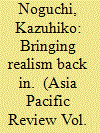

|
|
|
|
|
| Publication |
2011.
|
| Summary/Abstract |
This article argues that offensive realism is applicable to explain China's strategic behavior. Contrary to constructivist and liberal arguments, ideational and domestic factors are not the primary causes of China's strategic behavior. Instead, structural and material factors such as anarchy and the distribution of relative power significantly shape how China behaves in the Asia-Pacific. Furthermore, they have a larger impact relative to non-material/unit-level variables on China's policymaking. Available evidence strongly indicates that China's strategic behavior is driven by power maximizing calculation. China's grand strategy, its maritime ambition as well as naval modernization, and rapid growth rate of military expenditure all confirm the hypotheses of offensive realism.
|
|
|
|
|
|
|
|
|
|
|
|
|
|
|
|
| 2 |
ID:
124899
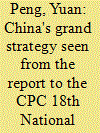

|
|
|
|
|
| Publication |
2013.
|
| Summary/Abstract |
This paper endeavors to draw a panoramic picture of China's grand strategy in terms of its strategic goals, environment, conditions, ideals and blueprint, taking as the context the challenges faced by China, as well as its responses. It asserts that in essence the Report represents a road map of major theoretical and strategic significance for navigating the course of China's peaceful development.
|
|
|
|
|
|
|
|
|
|
|
|
|
|
|
|
| 3 |
ID:
174124
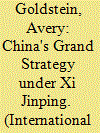

|
|
|
|
|
| Summary/Abstract |
China's grand strategy under Xi Jinping is clearly distinctive. It does not, however, fundamentally break with the grand strategy that China has embraced since the early 1990s—one that aims to realize what is now labeled “the dream of national rejuvenation.” Leaders in Beijing have implemented three different approaches to this strategy. In 1992, the approach to rejuvenation followed Deng Xiaoping's admonition for China to hide its capabilities and bide its time. In 1996, Beijing shifted to a more proactive approach, peaceful rise, seeking to reassure others that a stronger and wealthier China would not pose a threat. In 2012, Xi again recast the grand strategy of rejuvenation to realize the Chinese dream. His approach is distinguished by its combination of three efforts: (1) continuing earlier attempts to reassure others about the benign intentions of rising China, (2) moving China from rhetoric to action in promoting reform of an international order that has facilitated China's rise, and (3) resisting challenges to what the Chinese Communist Party defines as the country's core interests. Xi's bolder approach has further clarified China's long-standing international aspirations and triggered reactions abroad that raise doubts about the prospects for his approach to realizing the goal of national rejuvenation.
|
|
|
|
|
|
|
|
|
|
|
|
|
|
|
|
| 4 |
ID:
114709
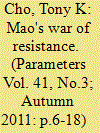

|
|
|
| 5 |
ID:
114841
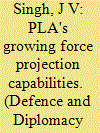

|
|
|
| 6 |
ID:
133381
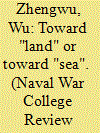

|
|
|
|
|
| Publication |
2013.
|
| Summary/Abstract |
China's maritime development having come up against pressures and challenges in recent years, the concept of "strategic hedging"-that is, pursuit of and investment in policies meant to protect the nation against the effects of geopolitical and economic uncertainty-has emerged. One of its most important proponents is Gao Bai, an ethnic Chinese professor of sociology at Duke University (in Durham, North Carolina) and the author of the article "The High-Speed Railway and China's Grand Strategy in the 21st Century" ....1 Professor Gao believes that the 2008 global financial crisis and the return, through its own strategic adjustment, of the United States to the Asia-Pacific region mean that China's "blue-water strategy" has come to an end.
|
|
|
|
|
|
|
|
|
|
|
|
|
|
|
|